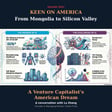
Confessions of a Meme Queen: I Created an Instagram Following to Trick People Into Letting Me Write a Book
Dubbed the Meme Queen of Depression by Mashable, Aiden Arata's real goal on Instagram was to build a big enough following to convince traditional publishers to let her write a book. Thus her new collection of essays, You Have a New Memory, in which Arata reveals the chillingly empty realities about her millennial "Doom" generation's relationship with social media. There really isn't much of an influencer economy, Arata confesses, acknowledging that most social media "stars" are, in fact, grifters. So the only way to monetize one's influencer status is by writing a traditional book which, Arata argues, also offers a refuge from what she calls the "flattened" language of digital media.
1. Arata Became an Influencer to Enable Her Real Dream
"I think that I created an internet following to trick people into letting me write a book. I've always wanted to write a book... I've always been a writer."
Arata reveals her Instagram success was strategic - a means to literary credibility rather than an end goal.
2. Social Media Has "AI'd" Us Before AI Arrived
"I think it's interesting because just sort of the way that algorithms train us to use certain language... we kind of have AI'd ourselves by mimicking certain phrases and just flattening... the field of interpretation for words."
She argues we've already been conditioned to communicate like machines, making actual AI less of a leap.
3. Digital Content Creates an Existential Crisis
"I call it plastic bag theory. And it's this idea that... the internet is like a plastic bag, it's disposable, but it's also forever. It's sort of on its trash island swirling out there somewhere. And then when we use the internet, we kind of become that as well."
Her metaphor captures how online content - and creators - exist in a liminal state between temporary and permanent.
4. The "Doom Generation" Faces Unprecedented Awareness
"We've never been so aware of all of the atrocities that happen around us and to us. And we've sort of also never been so aware of our own powerlessness to affect change."
She explains why her generation feels particularly anxious about the future.
5. Books Offer Refuge from Digital Language Flattening
"A book is a really beautiful response to that. It's reclaiming language as something that can go on these sort of philosophical eddies and can have a metaphor that's a little bit complicated... that is like just perfect in its weird slanty little way."
Despite her digital success, she sees traditional publishing as essential for preserving nuanced human expression.
Keen On America is a reader-supported publication. To receive new posts and support my work, consider becoming a free or paid subscriber.
This is a public episode. If you'd like to discuss this with other subscribers or get access to bonus episodes, visit keenon.substack.com/subscribe










